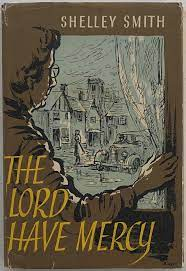Over the years, I've reviewed several of Shelley Smith's books on this blog. I was introduced to her work by Julian Symons' Bloody Murder and I share his enthusiasm for her work. He was especially keen on The Lord Have Mercy, and having recently acquired an inscribed copy of the Hamish Hamilton edition from 1956, I thought I'd share my thoughts on a book that I first read more than thirty years ago.
This is an English village mystery with a suspicious death at its heart, but first and foremost it's a study of character and of social attitudes. In many ways, it's a good illustration of the post-war shift in attitudes towards the genre. The puzzle is almost incidental to the portrayal of psychological disintegration and there's an ironic flavour to the writing that was guaranteed to appeal to Symons (as it does to me).
By modern standards, it's a short novel and frankly I think that is all to the good. A long, meaty crime novel is great - so long as the length is justified; alas, that isn't invariably the case. In The Lord Have Mercy, the writing is taut throughout and the final paragraph is disturbing and enigmatic.
I don't want to say too much about the detail of the story, but essentially it focuses on Editha, the desirable but provocative wife of the local doctor, a good man who is, as the story progresses, pushed to the limits of endurance by the behaviour of others. Smith (whose real name was Nancy Bodington) portrays him with sympathy and understanding and there's a subtlety about the characterisation that was relatively uncommon in the crime writing of its day. Jamie Sturgeon speculates that the village in the novel may have been based on Steyning in Sussex, where she lived.
To me, it's very surprising that after writing such a good novel, Smith produced only three more novels in the next twenty-one years. Like Margot Bennett and Mary Kelly, she seems to have run out of steam. I know less about her life than I do about those other writers, so I'm not quite sure why her productivity tailed off. But her books, even those that aren't wholly successful, are always interesting, and this quiet novel of small cruelties and misunderstandings is still well worth reading.

2 comments:
Just finished this one and it is certainly one of her best. I was surprised by all the lesbianism in this village for a 1956 book.
Yep, definitely different from St Mary Mead!
Post a Comment